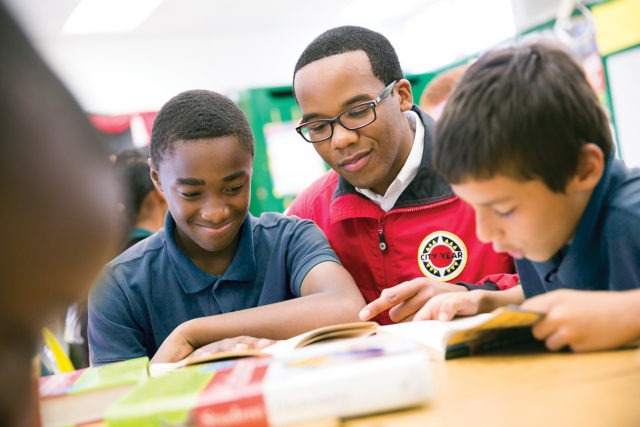A holistic approach to student success
City Year’s Whole School, Whole Child approach
A dozen years ago, City Year developed a research-based approach to support student and school success grounded in a belief that for children to flourish in school and in life, their holistic needs must be valued and addressed by caring adults in a nurturing school community. Today, our Whole School, Whole Child approach provides academic and social-emotional supports to thousands of students attending 350 systemically under-resourced public schools in 29 U.S. cities.
With our school and research partners, our organization has continued to refine and evolve the ways we support and advance student social, emotional and academic development. Here are three lessons we have learned along the way:
1. Relationships matter
The Aspen Institute’s National Commission on Social, Emotional, and Academic Development has emphasized that learning happens through relationships, and our approach in schools has benefitted greatly from the Search Institute’s work to elevate the importance of developmental relationships, which “help young people be and become their best selves.” Research demonstrates that positive, consistent relationships can provide a buffer against the effects of stress and trauma on children and promote resilience and positive outcomes. Relationships matter just as much for successful partnerships–whether between an AmeriCorps member and a classroom teacher; a principal and a parent; or a public school and a nonprofit organization. We know that relationships take time to develop and strong relationships between nonprofit partners, schools and students lead to greater collaboration and impact.

2. Students and adults need a growth mindset
We know that in order to promote resilience and optimism in students, parents, teachers and mentors must develop their own growth mindset, and learn to view their failures as inspiration and groundwork for future success. A great resource designed to help adults teach and foster adaptive beliefs about learning are the Growth Mindset toolkits from MENTOR: The National Mentoring Partnership and Stanford University’s PERTS Lab. City Year AmeriCorps members were fortunate to pilot the toolkit for mentors and they’ve reported that the skills they’ve learned have helped them to encourage students to stretch academically, build confidence and recover from setbacks. The toolkit is now being used throughout City Year’s network and by other youth-serving organizations.
3. It’s important to find common language and tools that promote an asset-based, youth development approach.
Aligned with our belief that all students have tremendous potential, we use and share frameworks that enhance the integration of student social, emotional and academic development with our school and community partners. One example: we partnered with The PEAR Institute: Partnerships in Education and Resilience at McLean Hospital, a Harvard Medical School affiliate, to field test and then adopt its Clover Model of youth development, a research-informed tool developed by Dr. Gil Noam. The Clover model highlights four essential elements, or “leaves,” that all people need to thrive, learn and develop, and provides proven strategies, a positive way to reframe student behavior, and a common, accessible language that can be used to support student strengths and address challenges. Using a shared framework creates greater consistency in the language, mindsets and experiences for students, teachers, AmeriCorps members and other school personnel.
We continue to benefit from new insights on what’s working from our partner schools, AmeriCorps members and alumni in education. We look forward to sharing more from those voices in the months ahead and continuing the national conversation on the foundational role that social-emotional development plays in efforts to ensure that all students are provided with the opportunity to succeed.
This piece originally appeared in August 2018 in the Education Week blog Learning Is Social and Emotional. It was updated in April 2020.
Jim Balfanz is President of City Year and serves on several boards, including the Council of Distinguished Educators for The Aspen Institute’s National Commission on Social, Emotional, and Academic Development.
Stephanie Wu is City Year’s Chief Impact Officer and leads the design, execution and evaluation of City Year’s Whole School, Whole Child services. As a founding staff member of City Year, she has overseen the development and scaling of City Year’s youth development practices that remain foundational to City Year’s work in schools and communities across the country.
Want to learn more about serving with City Year? Connect with us today:
Related stories
Here’s what “student success coach” means to us and why we believe more schools could benefit from having this additional...
Read more about City Year AmeriCorps members are student success coachesThe City Year Alumni Leadership Awards, presented by Truist, are City Year’s highest alumni recognition. The awards recognize outstanding alums...
Read more about City Year Honors Young Alum Derek QiuDid you know that one of the key benefits AmeriCorps members receive is access to the Segal Education Award to...
Read more about How to use your Segal Education AwardWhat does it mean to take a holistic approach to financial wellness? How do you take the full context of...
Read more about An Inclusive Approach To Financial Literacy















